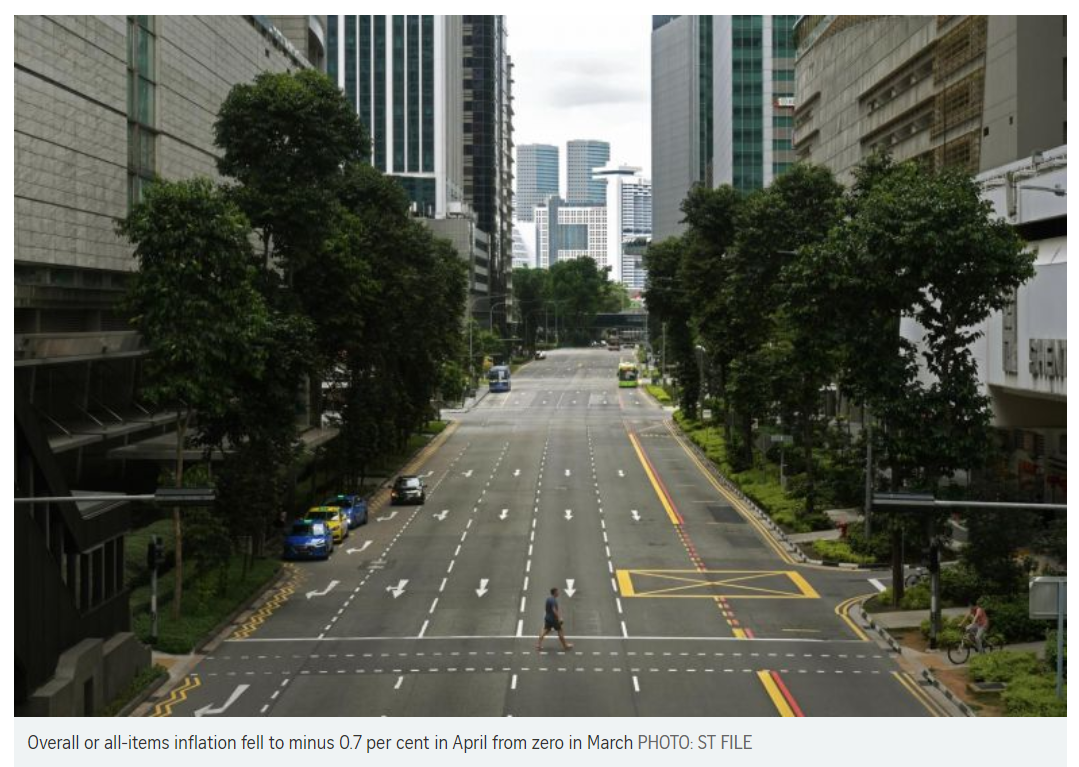Singapore overall inflation turns negative for first time since late 2016 amid Covid-19 measures
SINGAPORE – With consumption stymied by Covid-19 circuit breaker measures, overall inflation in Singapore turned negative in April for the first time since October 2016 on a sharp drop in car prices, while core inflation slid deeper into the same territory, official data released on Tuesday (May 26) showed.
Core inflation, which excludes accommodation and private road transport costs, fell to minus 0.3 per cent year on year last month, due to steeper declines in the costs of services and retail and other goods. It had dropped to minus 0.2 per cent in March and minus 0.1 per cent in February.
Overall or all-items inflation fell to minus 0.7 per cent in April from zero in March, driven mainly by a larger decline in the cost of private transport on top of the slide in core inflation, said the Monetary Authority of Singapore (MAS) and the Ministry of Trade and Industry (MTI) in a joint release on Tuesday.
Private transport costs fell more steeply to minus 5.5 per cent in April, from minus 0.3 per cent in March, reflecting a sharp drop in car prices and a larger decline in petrol prices. The suspension of Electronic Road Pricing charges in April also lowered private transport costs.
The cost of retail and other goods saw a larger decline year on year to minus 1.6 per cent in April, from minus 0.9 per cent in March. This was due to a sharp drop in the price of telecommunication equipment, as well as a bigger fall in the prices of personal effects such as travel goods.
Accommodation costs were unchanged at 0.5 per cent year on year in April as housing rents rose at a steady pace.
The cost of electricity and gas fell 5.2 per cent year on year in April, a slower pace of decline than the 6.2 per cent drop in March. The pace of decline in the cost of electricity and gas had eased as the Open Electricity Market had a smaller dampening effect on electricity prices due to a slowdown in new take-up rates.
Food costs rose by 2.1 per cent year on year in April, from the 1.5 per cent increase in March, due to non-cooked food items recording larger price increases. Meanwhile, inflation in prepared meals remained broadly unchanged.
Services inflation fell to minus 1.1 per cent year on year in April and was up from minus 0.7 per cent in March, due to steeper declines in holiday expenses and airfares, as well as a smaller increase in domestic household services costs.

MAS and MTI are expecting inflation to remain subdued, keeping to its 2020 forecast range for both core inflation and overall inflation of minus 1 per cent to 0 per cent.
MAS said earlier on Tuesday that its monetary policy is unchanged and appropriate, and that the next review will be at its scheduled October meeting.
“The monetary policy stance remains appropriate and our inflation projections are unchanged,” said Mr Edward Robinson, MAS deputy managing director, speaking at the virtual press conference on Singapore’s first-quarter economic survey.
In its last review on March 30, which was brought forward from April, MAS eased its exchange rate-centred monetary policy and lowered its inflation projections for the year amid a worsening economic outlook.
Source: https://www.straitstimes.com/business/economy/singapore-overall-inflation-turns-negative-for-1st-time-since-late-2016-amid-covid


 English
English




